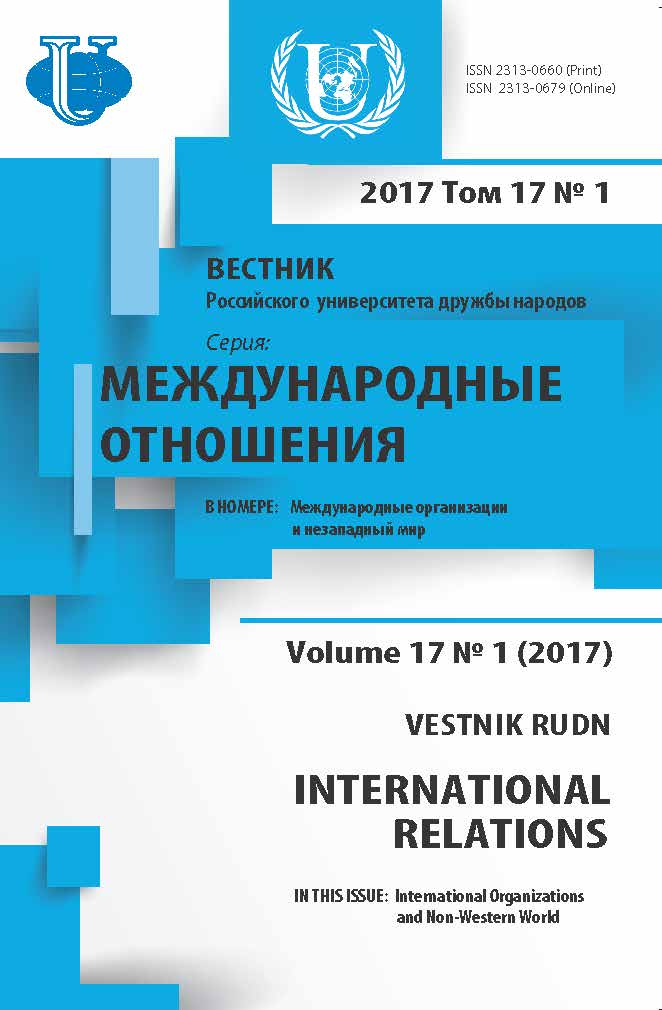Colonial legacy as a source and a problem in South-South Cooperation: The Case of Brazil
- Authors: Pavlova E.B.1
-
Affiliations:
- University of Tartu
- Issue: Vol 17, No 1 (2017): International organizations and Non-Western World
- Pages: 48-58
- Section: THEMATIC DOSSIER
- URL: https://journals.rudn.ru/international-relations/article/view/15876
- DOI: https://doi.org/10.22363/2313-0660-2017-17-1-48-58
Cite item
Full Text
Abstract
The aim of this article is to identify the key narratives of colonial legacy as nodal points in the articulation of the Brazilian agenda in the South-South cooperation. Brazil’s aspirations for regional leadership and attempts to increase its international prestige are analyzed in a constructivist framework. Most importantly, our theoretical reasoning departs from the constructivist take on the agent-structure debate, proposed by A. Wendt in 1987. This approach, firstly, helps to clarify the main difficulties which Brazil faced in Latin America and to examine Brazilian efforts to overcome colonial legacy in order to secure regional leadership, one of the principal goals of its foreign policy. Secondly, colonial legacy can be seen as an unconditional source for the geographical expansion of Brazil’s influence and the increasing the number if its allies by means of the South-South cooperation. Thirdly, we demonstrate the very complex relationship on the structural level between the BRICS project and the problem of colonial legacy. Using the example of Brazil as a state which, on the one hand, has not been able to overcome the postcolonial complex, and on the other, is actively performing political rituals aimed at demonstrating its increasing power, we can more clearly outline the possibilities and limitations inherent in the structure of contemporary international system. Finally, this research suggests that BRICS, a group that claims to articulate the principles of the new world order, more beneficial for the states of the South, has limited chances to succeed with that mission.
About the authors
Elena Borisovna Pavlova
University of Tartu
Author for correspondence.
Email: elena.pavlova@ut.ee
Tartu, Estonia
References
- Bell, C. (2009). Ritual: perspectives and dimensions. Oxford: Oxford University Press.
- Burges, S. (2007). Building a Global Southern Coalition: The Competing Approaches of Brazil's Lula and Venezuela's Chávez. Third World Quarterly, 28(7), 1343—1358. doi: 10.1080/01436590701591911
- Flemes, D. (2011). India, Brazil and South Africa (IBSA) in the New Global Order: Interests, Strategies and Values of the Emerging Coalition. International Studies, 46(3), 401—421. doi: 10.1177/002088171004600402.
- Flemes, D., & Cooper, A. (2013). Foreign Policy Strategies of Emerging Powers in a Multipolar World: an Introductory Review. Third World Quarterly, 34(6), 943—962. doi: 10.1080/01436597.2013.802501.
- Gehre Galvão, T. (2009). América do Sul: construção pela reinvenção (2000—2008). Revista Brasileira de Política Internacional, 52 (2), 63—80. doi: 10.1590/S0034-73292009000200004.
- Gomes Saraiva, M. (2012). Procesos de integración de América del Sur y el papel de Brasil: los casos del Mercosur y la Unasur Revista. CIDOB d’afers internacionals, 97—98, 87—100.
- Kertzer, D. (1983). The role of ritual in political change. In: Aronoff M. J., editor. Culture Political Change. New Brunswick: Transaction. P. 71—53.
- Malamud, A. (2011). A Leader Without Followers? The Growing Divergence between the Regional and Global Performance of Brazilian Foreign Policy. Latin American Politics and Society, 53(3), 1—24. doi: 10.1111/j.1548-2456.2011.00123.x.
- Mielniczuk, F. (2013). BRICS in the Contemporary World: changing identities, converging interests. Third World Quarterly, 34(6), 1079—1080. doi: 10.1080/01436597.2013.802506.
- Olivier, G., & Fioramonti, L. (2011). The emerging ‘global south’: the EU in the eyes of India, Brazil and South Africa. In: Fioramonti, L., Luccarelli, S., editors. External Perceptions of the European Union as a Global Actor. London and New York: Routlegde. P. 105—119.
- Sorj, B., & Fausto, S. (Eds.). (2013). O Brasil e a Governança da América Latina: Que Tipo de Liderança é Possível? Rio de Janeiro: Fundaçâo Instituto Fernando Henrique Cardoso; IFHC.
- Vieira, M. A., & Alden, Ch. (2011) India, Brazil, and South Africa (IBSA): South-South cooperation and the paradox of regional leadership. Global Governance, 17(4), 507—528.
- Wendt, A. E. (1987). The Agent-Structure Problem in International Relations Theory. International Organization, 41(3), 335—370. doi: 10.1017/S002081830002751X.











